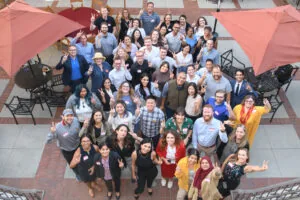Description
Conspiracy theories have captured the attention of people throughout history, and they have become especially influential in current politics. Some recent conspiracists have even deliberately adopted the language of the Middle Ages to advance their agenda. In this seminar by the USC Dornsife Center for the Political Future (CPF), panelists break down the history of conspiracy theories dating back to the Middle Ages and compare them to contemporary beliefs. They also discuss how the deep state and QAnon conspiracy theories influenced political messaging in the age of Trump.
The panel, in partnership with the USC Center for the Pre-Modern World and Rancho Mirage Writers Festival, features: Elizabeth A. R. Brown, Professor Emerita of History at Brooklyn College and The Graduate Center, CUNY; Dallas Denery, author and professor of history at Bowdoin College; Sara Gorman, mental health expert and author of Denying to the Grave: Why We Ignore The Facts That Will Save Us; Norbert Schwarz, Provost Professor in the Department of Psychology and USC Marshall School of Business and co-director of the USC Dornsife Mind and Society Center. Moderated by Kamy Akhavan, CPF executive director.
Who Will Benefit
– Those who want to understand how modern conspiracy theories have been influenced by the psychology of the medieval world
– Mental health experts hoping to further grasp the historical context of groups like QAnon and anti-vaccination activists
– Those looking to explore how individuals’ pre-existing values determine their belief in conspiracy theories
About Our Featured Faculty
Kambiz “Kamy” Akhavan, former CEO of ProCon.org, the nation’s leading source of nonpartisan research on controversial issues, now leads the Center for the Political Future (CPF) at USC. As the executive director, Akhavan oversees the operations of all Center components including the Unruh Institute of Politics, the Fellow’s Program, the USC Dornsife Poll, and community and global engagement.
Akhavan writes and speaks on numerous topics including the origins of and solutions to political polarization, improving interpersonal communication, the awesome power of debate, how to burst echo chambers, nonprofit leadership, digital marketing, critical thinking, civics education and how to teach controversial issues in your classroom. In addition to those topics, Akhavan is a moderator, panelist and keynote speaker on specific issues from marijuana legalization to gun control and from the death penalty to physician-assisted suicide.
With more than 20 years of experience in bridging divides at national levels, Akhavan’s work has served more than 200 million people, including students at more than 12,000 schools in all 50 states and 100 countries. He has been published and interviewed in textbooks, magazines, television, radio, newspapers and websites including Reuters, Associated Press, Fox News, ABC, Washington Post, NPR, CNN and CBS. Akhavan was born in Iran, grew up in southern Louisiana, and has lived in California for more than 25 years. He holds a BA and MA in History from UCLA.
Norbert Schwarz is Provost Professor of Psychology and Marketing at USC Dornsife College of Letters, Arts, and Sciences and USC Marshall School of Business. He is also co-director of the USC Mind and Society Center. Schwarz is an expert in consumer judgment and decision-making. He investigates how subtle contextual influences shape how we make sense of the world, with downstream consequences for consumer behavior, health behavior, and political preferences. Schwarz has been elected to the American Academy of Arts and Sciences, the German National Academy of Science and the Academia Europaea (pan-European academy of arts and sciences). He serves on the editorial boards of leading journals in marketing, psychology and the social sciences. Prior to joining USC, he was the Charles Horton Cooley Collegiate Professor of Psychology, Business and Social Research at the University of Michigan.



